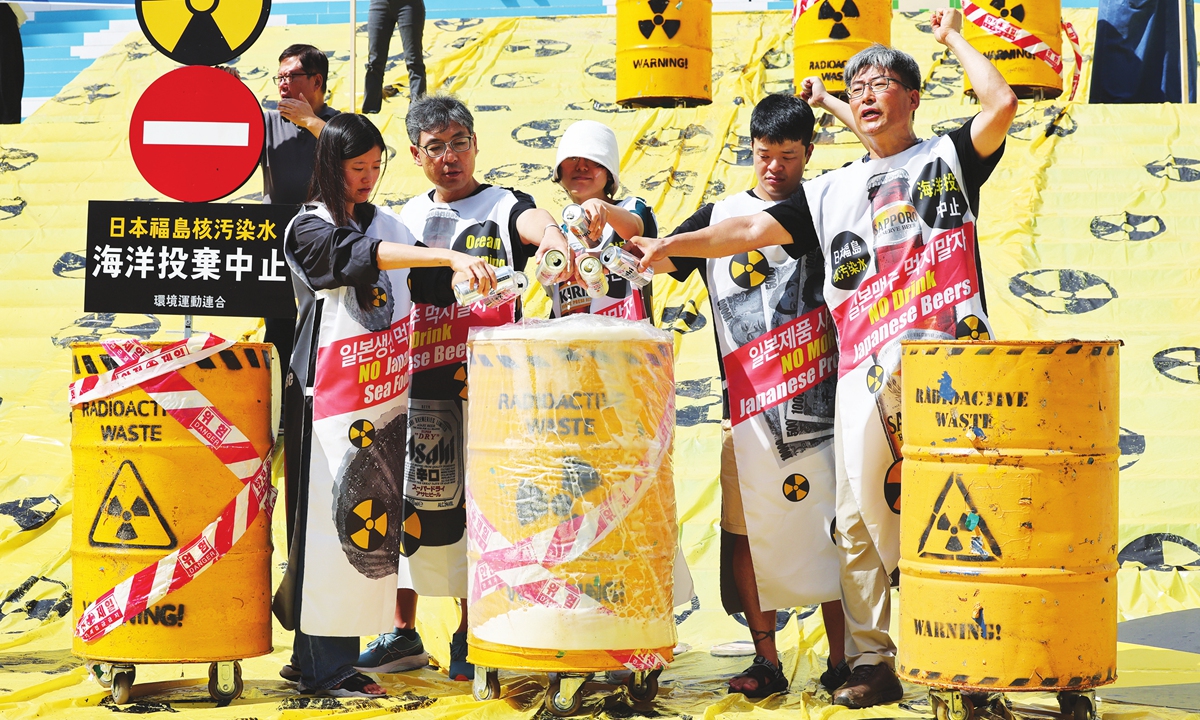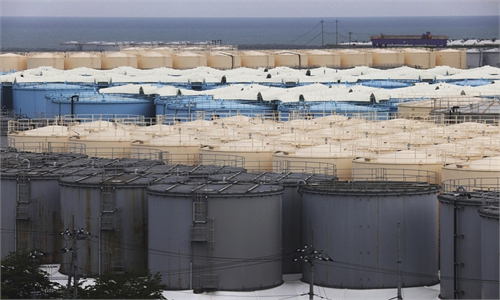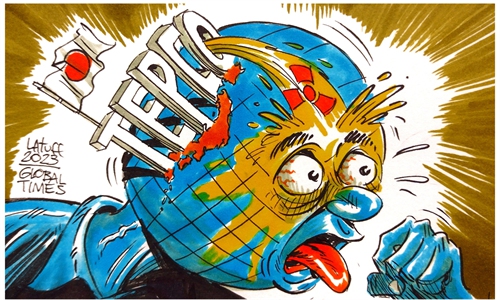
South Korean activists protest against nuclear-contaminated Fukushima water dumping in Seoul on September 18, 2023. Photo: VCG
Editor's Note:Despite widespread opposition both domestically and internationally, the first phase of dumping nuclear-contaminated wastewater from Fukushima concluded on September 11. The commencement of the second phase is potentially scheduled for late September. This move has significantly impacted the populations of the Pacific region. However, when China expressed legitimate concerns, it faced criticism from some US and Western media. Why does Japan insist on this course of action despite opposition? How should people view relevant countries' legitimate concerns? Global Times (GT) reporter Ma Ruiqian discussed these issues with Komei Hosokawa (Hosokawa), emeritus professor at Kyoto Seika University, board director of the Takagi Fund for Citizen Science and secretariat member of the Citizens Commission on Nuclear Energy (CCNE). This is the second installment of the series.
GT: Tokyo Electric Power Company (TEPCO) recently admitted that about 66 percent of the nuclear-contaminated water in the storage tanks exceeds the standard for radioactive substances. Were you shocked by this news?
Hosokawa: This is a well-known fact that TEPCO and the government of Japan don't like to be the focus of public attention. There are two important aspects to consider. First, looking back, TEPCO had not disclosed this very important fact even to the ministerial councils until it was shockingly revealed by the Kyodo News scoop in August 2018. Second, looking ahead, TEPCO claims they can "re-purify" the water exceeding the regulatory limits by sending it through the Advanced Liquid Processing System (ALPS) again and repeating the process if necessary, but practically they have not verified it yet. They have done only a very limited amount of trials. Thus, we do not really know if the two-thirds of the radioactive water in storage can be decontaminated to meet the regulatory limits for discharge.
GT: The Japanese government has not adopted alternative methods to handle nuclear-contaminated water and is instead insisting on discharging it into the ocean. What do you think are the reasons?
Hosokawa: The Japanese government said the ocean release was the cheapest and the fastest way when compared to other methods. The cost and length of operation figures they used for comparison have now turned out to be extremely underestimated (3.4 billion yen vs. the current estimate of at least 120 billion yen; 7.5 years vs.the current estimate of 30-40 years, which could be much longer).
There seem to be two main reasons why the Japanese government insists on ocean release. First, in the event of another nuclear accident in Japan, they want radioactive discharge to the sea to be allowed from the beginning, without the trouble and cost of storage they had to deal with in Fukushima. Second, the Japanese government wants to start up the reprocessing plant in Rokkasho, Aomori (currently under construction and yet to be approved by the regulator, Nuclear Regulation Authority). Operation of the reprocessing plant will inevitably involve a huge amount of tritium discharge to the sea. Obviously, the Japanese government wants to avoid any controversy surrounding this issue. They want to say "it was OK in Fukushima!"
GT: How do you view the Japanese government's decision to proceed with ocean discharges despite domestic and international opposition?
Hosokawa: Quite simply, the decision and the process leading to it have been undemocratic. The current administration holds the absolute majority in both houses of the parliament, and quite often skips troublesome deliberations. To make the matter worse, the nuclear energy issue is administered almost exclusively by the Ministry of Economy, Trade and Industry (METI) with only a small role played by the environment, health and fishery ministries. The political weakness of major media outlets makes the situation even worse.
GT: Reflecting on your supervised documentary Fukushima 10 Years Later: Voices from the Continuing Nuclear Disaster, how do you view the psychological, physiological and economic impact of Japan's actions on fisherfolk?
Hosokawa: The agony the fishery community had to go through in the last 12 years has been intense and terrible. Now TEPCO and the Japanese government have broken their promise again, the community's distrust of politics may be irreparable. As I depicted in the documentary, the local fisherfolk continuously carry out radiation monitoring of all the fish species they catch and abide by a voluntary limit of 50Bq/kg for radioactive cesium, twice as strict as the Japanese government's regulation of 100Bq/kg. Their hard work and endurance were thought little of by the Japanese government.
However, given the enormous economic loss since 2011, it is also a harsh reality that the local fishing industries need official financial support. That may explain, at least partially, why the national, prefectural and local fishery unions do not very much resist the rude push from the Japanese government, while the individual union members are furious and feel insulted.
GT: Currently, some regions have suspended the import of Japanese seafood products. Besides this, what do you think other countries and regions can do during the planned 30-40 years of water discharges?
Hosokawa: There should be interventions, based on the established international laws, such as the London Convention's radioactive waste dumping protocol and the UNCLOS which firmly upholds the precautionary principle in the protection of marine environment.
GT: There is a phenomenon where Japan discharges water, and China receives criticism. Faced with Japan's unreasonable discharge of nuclear-contaminated water, why can't China express legitimate concerns?
Hosokawa: Although it is true that there are certain political elements in the strong position taken by the Chinese government, the concerns on environmental and health reasons are legitimate. It should also be understood that Chinese experts' proposal of taking up the evaporation method (ie releasing tritium into the air, but keeping non-volatile radionuclides contained) is radiologically safer and more reasonable than Japan's way of dumping all the residual radionuclides into the sea. CCNE recommends mortar solidification in concrete pits, which is even safer than evaporation.
Japan's LDP administration is apparently exploiting anti-China sentiment in order to divert public attention from the environmental focus of the radioactive discharge issue. It is a great shame that it has become a new addition to the already growing racism and exclusionism in the country.
GT: People in neighboring countries around the Pacific have been at the forefront of opposing Japan's ocean dumping plan. In your opinion, why have we been unable to stop Japan from releasing contaminated water into the ocean?
Hosokawa: Japan's foreign affairs ministry seems to be working hard to divide the Pacific countries, mainly by offering additional development aid. However, that civil society organizations and local councils maintain firm opposition to Japan's discharge plan. So far exchange of information and ideas between the civil society sectors of Japan and the Pacific countries has been insufficient. The Japanese government can activate the existing diplomatic and economic ties. It's urgently critical to relay the voices of the Pacific peoples' concern to Japanese society, media and the decision makers.
GT: Experts believe that the US tolerates Japan's ocean dumping of nuclear-contaminated water fundamentally as a trade-off, using the global marine environment and the health of all humanity in exchange for US geopolitical interests. How do you evaluate this trade-off? Is it worth it?
Hosokawa: I am no expert in geopolitics, but I see the US-China rivalry is surely a big factor in the US attitude on the Fukushima water issue. Bureaucrats and technocrats in Japanese government are inclined too much to conform to the overwhelming power of the US and to forget about Japan's own geopolitical interests, such as Japan's inherent position as a maritime country and its indispensable friendship with the neighboring Asia-Pacific states.


